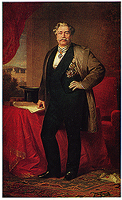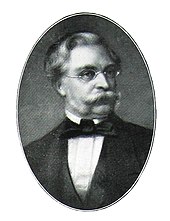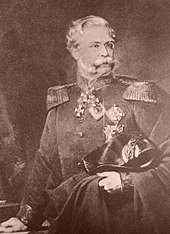Friedrich von Kühlwetter
Friedrich Christian Hubert Kühlwetter , who has been with Kühlwetter since 1866 , (born April 17, 1809 in Düsseldorf , † December 2, 1882 in Münster ) was a German administrative lawyer and Prussian civil servant , who last served as President of the Province of Westphalia .
Live and act
Kühlwetter's father, Johann Heinrich Josef Kühlwetter (born October 14, 1757; † May 5, 1835), studied in Heidelberg, he was appointed administrator and judge in 1784 before he was entrusted with the state secretariat in the Grand Duchy of Berg in 1787 . During the difficult time of the Napoleonic occupation , he acquired the name “ loyal Eckart des Bergisches Land” (cf. Niehues 1883). Eduard Kühlwetter was one of his sons .
The eldest son Friedrich studied law and political science at the Ruprecht-Karls-Universität Heidelberg and at the Rheinische Friedrich-Wilhelms-Universität Bonn . During his studies he became a member of the old Bonn fraternity in 1826 . In 1830 he entered the civil service as an auscultator at the Arnsberg court . In 1832 he became a court referendar and in 1835 a court assessor in Düsseldorf . He succeeded there with a treatise on the Arnsberg statutory law. He was then from 1836 to 1845 state procurator at the regional court. Between 1845 and 1848, Kühlwetter worked as the administrative director of the Düsseldorf-Elberfeld railway company .
Politically, Kühlwetter was a representative of Rhenish liberalism . In 1847 he was a member of the United State Parliament. A year later, Kühlwetter was elected a member of the Prussian National Assembly and a deputy member of the German National Assembly. From July 25 to September 28, 1848, he was Minister of the Interior in the Hansemann - Auerswald cabinet . In the Berlin parliament he represented moderately liberal views and after his resignation as minister belonged to the right-wing parliamentary group.

Kühlwetter was then district president in Aachen until 1866 , where a street was named after him in 1929 because of his significant support and funding for the establishment of the Aachen Polytechnic . By representing the government course, he made himself unpopular there despite his Rhenish and Catholic origins. Between 1849 and 1850 he was a member of the first chamber of the Prussian state parliament .
In 1866 he was raised to the nobility and in the same year transferred to Düsseldorf as district president . There he earned general recognition through diligent care for art and science. In 1870 he received the post of civil governor in the occupied territory of Alsace-Lorraine , based in Strasbourg under General Friedrich Alexander von Bismarck-Bohlen .
Subsequently, in September 1871, he was promoted to President of the Province of Westphalia , where his position became difficult due to the beginning of the Kulturkampf . Kühlwetter represented with determination the rights of the State and sought, including by calling liberal teacher at the Westfälische Wilhelms-Universität Münster , the influence of the Center Party to reduce the Catholic population of Westphalia - he spoke of them from the rule of Ultramontanism to free .
He was therefore most violently hostile to the clerical party. Nevertheless, his services to the expansion of the University of Münster and as a founding member of the Provincial Association for Science and Art are undisputed. Kühlwetter died on December 2, 1882 in Münster. A portrait of Friedrich Kühlwetter, painted by Franz Reiff , is in the possession of the Technical University of Aachen.
He married Therese Thüsing on June 23, 1835, with whom he had five children. The eldest son Friedrich von Kühlwetter (1835-1904) was district administrator in Berncastel and Düsseldorf . His eldest son Friedrich von Kühlwetter (1865–1931) was Imperial Rear Admiral and 1914–1917 Commander in Chief on the Bosporus with the title of Turkish Pasha .
literature
- Karl Wippermann : Friedrich von Kühlwetter . In: Allgemeine Deutsche Biographie (ADB). Volume 17, Duncker & Humblot, Leipzig 1883, pp. 322-331.
- Wolfgang Stribrny: Friedrich von Kühlwetter. In: New German Biography (NDB). Volume 13, Duncker & Humblot, Berlin 1982, ISBN 3-428-00194-X , pp. 190 f. ( Digitized version ).
- D. Wegemann: The leading state administrative officials of the Province of Westphalia 1815-1918 1969.
- Mechthild Black-Veldtrup , Friedrich von Kühlwetter , in: Westfälische Lebensbilder , 18, Münster 2009, pp. 60–78.
- Helge Dvorak: Biographical Lexicon of the German Burschenschaft. Volume I: Politicians. Volume 3: I-L. Winter, Heidelberg 1999, ISBN 3-8253-0865-0 , pp. 196-197.
- Friedrich Kühlwetter: The Arnsberg statute law; a preliminary treatise by the court and regional court assessor Kühlwetter zu Düsseldorf . In: Yearbooks for Prussian legislation, jurisprudence and legal administration . Published on behalf of the Royal. Justiz-Ministry 46th volume, 91st and 92nd issue, issue 91, Berlin 1835, pp. 36–70.
- Niehues: Obituary for Dr. Friedrich Christian Hubert v. Cooling weather . With a portrait of the deceased. In: Annual report of the Westphalian Provincial Association for Science and Art , Vol. 11, for the year 1882, printed Münster 1883, p. XXXV-LI.
- Waldbrühl / Montanus: The faithful Eckardt of the Bergisches Land - Johann Heinrich Kühlwetter zu Düsseldorf . In: The past. Legends and stories from the countries of Cleve-Mark, Jülich-Berg and Westphalia von Montanus . In a scientific revision by Wilhelm von Waldbrühl and Montanus, second volume, Elberfeld 1871, pp. 227–230.
Web links
- Short biography of the Berlin State Library
- http://www.archiv.rwth-aachen.de/?p=852
- http://www.zeno.org/Meyers-1905/A/K%C3%BChlwetter
Individual evidence
- ^ Klaus Herdepe : The Prussian Constitutional Question 1848 . Neuried 2002, ISBN 3-936117-22-5 , p. 153.
| personal data | |
|---|---|
| SURNAME | Kühlwetter, Friedrich von |
| ALTERNATIVE NAMES | Kühlwetter, Friedrich Christian Hubert von (full name); Kühlwetter, Friedrich |
| BRIEF DESCRIPTION | German administrative lawyer and Prussian civil servant |
| DATE OF BIRTH | April 17, 1809 |
| PLACE OF BIRTH | Dusseldorf |
| DATE OF DEATH | December 2, 1882 |
| Place of death | Muenster |



